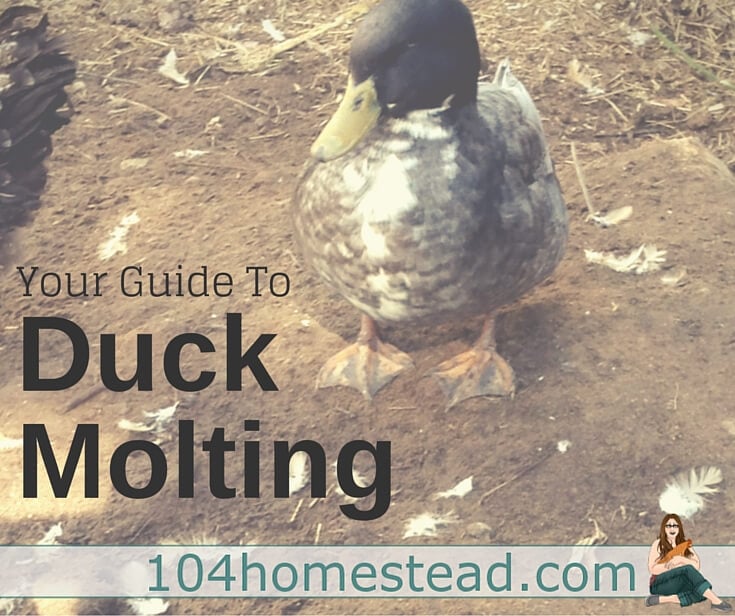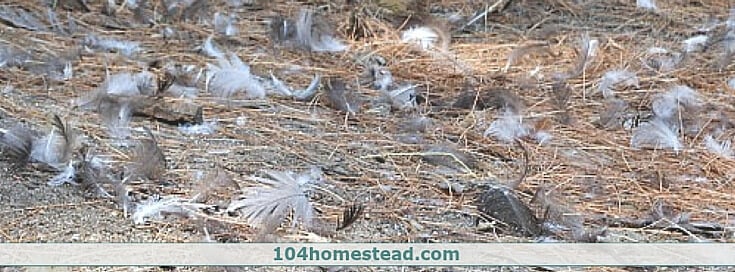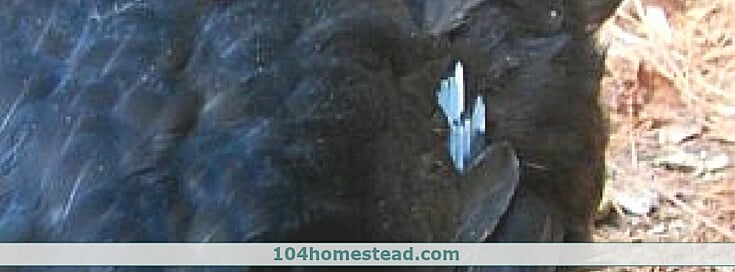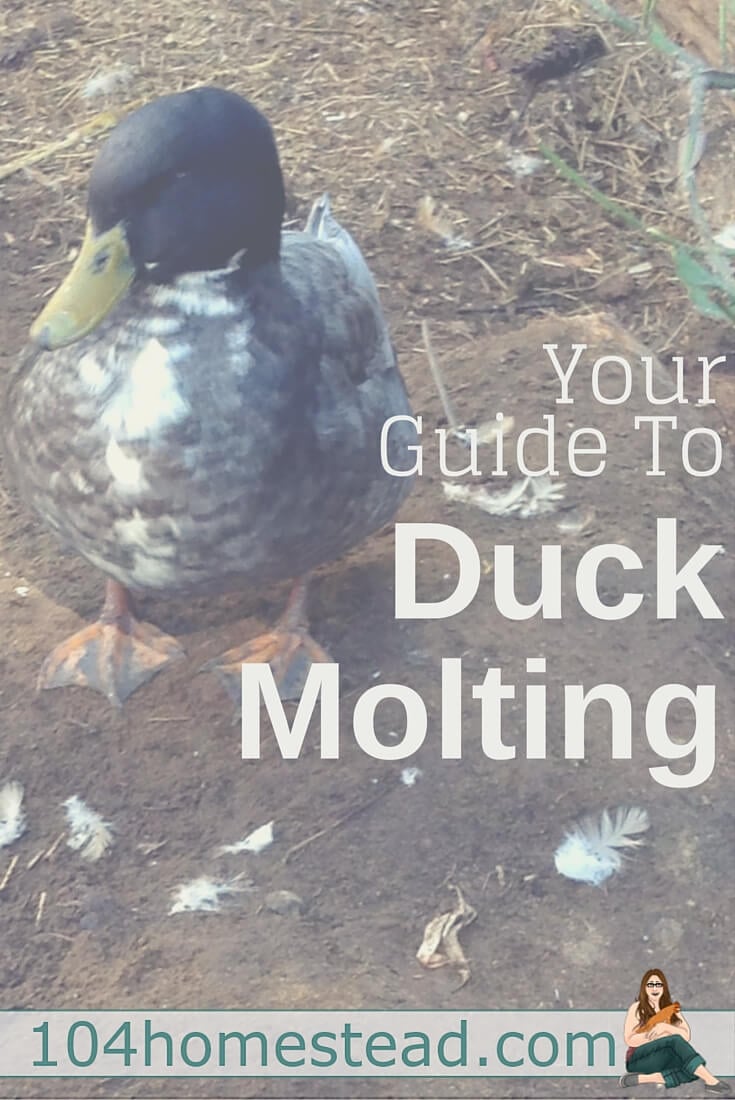Your Seasonal Guide to Duck Molting
Ducks actually have a couple of molting phases and each one looks different. The effects are most obvious in drakes. Spring, summer and fall molts.

Today you are getting a post brought on by my trip to the coop this morning…
I went out to check feeders and waterers this morning (as I do every morning) and it looked like there was a pillow fight in the yard. Well beyond the coop there were feathers blowing about. I’m sure you all know what my internal dialog was saying. Being a PG-rated blog, I won’t specifically say what it was, but it wasn’t good.
I was opening the door expecting carnage. No blood. Maybe a raptor of some sort? I started the head count. Fifteen chickens and three ducks all in seemingly good health. Seriously, this is a lot of feathers. What could have happened?
Duck vs. Chicken Molting
I took a closer look at the ducks and it clicked. Summer Molt You see, ducks don’t molt the same way a chicken does. Chickens molt in phases, starting with their heads and working down to their tails. Even with a hard molt (they don’t regrow feathers fast enough and it leaves them running around naked for a bit), chickens don’t have enough feathers to cause this much of a mess. Ducks, however, have many feathers under that sleek exterior and sometimes they drop out all at once.
Ducks actually have a couple of molts and each one of them looks different. The effects are most obvious in drakes.
Spring – Eclipse Molt
In the early spring, sexually mature drakes will have what is called an eclipse molt. This molt only results in a few stray feathers floating around. Drakes shed off their muted feathers and these feathers are replaced with bright breeding feathers. The brighter the plumage the more likely the male is to be chosen. This is where the cocky attitude appears. My drake literally struts around when he has his breeding plumage. He also tries to mate anything with feathers, resulting in a temporary separation from the chickens (well, really one chicken in particular who doesn’t appreciate his advances).
Summer – The BIG Molt
This time of year (July) is the big molt. Both males and females go through this one. This is where they lose almost all of their down feathers. Other than a few scraggly looking top feathers, the only evidence of this molt is what I woke up to this morning. It literally looked like a pillow fight out there. In just a week or two (at the most), your ducks will lose all of their down. It is simply amazing how much there is. During this time you will see down feathers stuck to your ducks’ bills. Your first thought might be that they are fighting, but no, it’s from their constant grooming habits. Here’s some pictures to show you the feather loss of two ducks (my third wont do a summer molt until next year):

Fall – Flight Feather Molt
This is the third and final molt for ducks in the year. This one really intrigues me because, although it affects both males and females, in the wild the drakes handle this molt differently than females. Flight feather molt obviously refers to the molting of flight feathers. This is a very unsafe thing for wild ducks since, without flight feathers, they can’t fly.

In the wild, females would be off caring for their juvenile young at this phase. They just carry on like nothing is happening, completely unfazed. Drakes on the other hand band together. They will typically stay out on the water where they are safe from predators and they will stay out there with all the other drakes. I can only assume that they are at the greatest risk during this molt because they still have some of their bright plumage.

So if you go out to tend your flock this morning and see feathers floating everywhere, don’t panic. It may just be molting.
Fun fact: Female ducks are referred to as “ducks” or “hens.” I chose to use the term “female” to avoid confusion since chicken hens do not molt in the same manner.

How long before the ducks get their original feathers back?
I’ve got 6 mucovy ducks. All of them molted in the spring except for 1 hen. I thought nothing of it until the fall. She’s not molting now either. Her feathers look horrible, and she not tolerating the cold. Do you have any experience with this?
This is a great molting guide. I had noted my flock molting periodically, but never categorized it. So very helpful. That being said, this year’s summer molt coincided with 4 of my females going broody. Feathers are coming back in, but they’re presenting male! All four. None have started laying again. I know this switching sex can happen, but seems strange, all 4 at once. Have you come across this before? I am wondering if there is some environmental factor in play here. To note, the rest of my flock is one drake, and 2 other females. So my flock seems to be switching from 1 drake, 6 ducks, to 5 drakes, 2 ducks. And all the problems therein. My drake does seem to recognize the others as drakes now too.
Hi! Thanks for the post! Quick question… how long does your summer mold last and do your ducks continue to lay or take a break?
Thank you!
Tammy
Hi I have a question
We have a Pekin drake he will not open his wings. He is a year old and he did flap his wings and spread them to stretch and such but now I have noticed he isn’t opening them. What could be wrong? Any help is appreciated.
Thank you
Hello, should I change the diet of my drake wood duck while he is molting? If so what should I change it too. Right now he eats cracked corn and game starter mix.
that adorable, i feel ya 🙂 this is my husbands and my 5th year doing the garden thing we now have a total of 15 ducks half runner and half Peking, 12 chickens , i want two goats, two pigs and boy hes like yeah yeah ,lol i would like a horse for our coral as well, but like you said 🙂
Am I a homesteader? A wanta Be, definitely. This is what I do know. I love the simple life, good old hard work, animals, growing food (although I might starve if I don’t get better at the growing). living simply and wisely, whatever that is. I’m 57 yrs. married 39yrs. would I imagine this lifestyle yrs ago. NO NO. We change, we go back to our childhood and pull from that. That is what I’m trying to do. I feel that if I don’t “get” this thing in me I will lose a very precious part of myself. Now, heres my dilemma incase your saying jeez woman just do it. My husband hates this lifestyle, I live in a suburban neighborhood and everyone thinks I’m crazy. Me, my 4 chickens 3 ducks and one rabbit. Oh and sort of a garden. Soooo what is this? I hope to hear from you it’s all big and scary out here by myself. lol
My husband is supportive, but he is certainly not engaged in the process (though he greatly enjoys the results – home raised chicken on a bed of roasted homegrown veggies lol). I still get eye rolling when I suggest we get a new animal – like my current plea for fiber rabbits – but he knows I’m going to go ahead and do it, and he’ll be thankful I did when he puts on his new winter hat. I guess what I’m saying is sometimes you have to pioneer on and they’ll catch up.